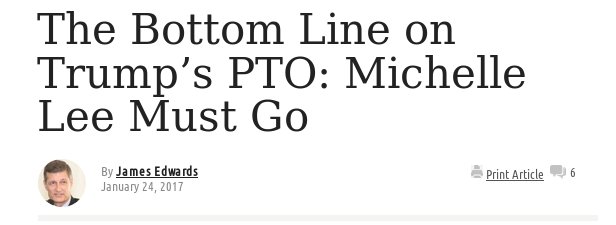

THERE are two actions against the PTAB right now. We last wrote about that yesterday. One is at a legislative level, namely the anti-PTAB STRONGER Patent Act of 2017 (by "stronger" it actually means weaker and lower-quality patents). The other one is a US Supreme Court (SCOTUS) case, in which the anti-PTAB blog Patently-O can't help meddling. In most days of August it attacked PTAB (almost every single day), writing little more than/besides that.
"In most days of August it attacked PTAB (almost every single day), writing little more than/besides that."As a reminder to non-regular readers (or occasional watchers of patent matters), SCOTUS almost always rules to improve patents, i.e. to improve patent quality rather than 'dilute' the whole lot with lousy patents. SCOTUS overturned CAFC about half a dozen consecutive times. Another case had been decided by SCOTUS (years ago, not just now). It was not about software (even by a long shot), but patents as judged by SCOTUS in this case (misuse for protectionism) resulted in punishment in the form of legal bills for the plaintiff:
A federal appeals court has upheld a decision mandating that Icon Health and Fitness pay $1.6 million in attorney's fees for filing an unwarranted patent lawsuit against a competitor.
Icon sued Octane Fitness in 2009, saying that Octane's high-end elliptical machines infringed US Patent No. 6,019,710, which describes an elliptical machine that allows for adjustments to accommodate individual strides. After two years of litigation, a district court judge found that Octane's machines didn't infringe. Octane asked for an award of legal fees, but in 2011, a judge rejected the company's bid. That decision was upheld on appeal.
[...]
But the fact is that it was nearly impossible to win fees in a patent case in 2011. However, Octane didn't take its loss sitting down. The company appealed to the Supreme Court, which heard oral arguments on the case in 2014.
In a 9-0 vote, the court issued an opinion (PDF) making it much easier to get attorney's fees. Justice Sonia Sotomayor wrote the opinion, holding that patent laws call for awarding fees in an "exceptional" case, which is "simply one that stands out from others with respect to the substantive strength of a party's litigating position... or the unreasonable manner in which the case was litigated."
Today? That same case would likely have been tossed out within six months on an Alice motion, or perhaps would have quickly settled after the inevitable IPR institution by the PTAB. Furthermore, the plaintiff would have likely had to contend with potential IPR filings by a host of third-parties, including from potential future targets interested in nipping a potential threat in a proverbial bud.
[...]
Want to minimize the risk? Assert more patents. (It is no surprise that one of the recommendations offered to anxious branded pharmaceutical companies — worried about increased susceptibility to generic companies filing IPR’s — was for them to file more patents on their drugs.) Prospective patent plaintiffs know that the most sure-fire (but not foolproof) way to avoid seeing their enforcement campaigns wither under an IPR onslaught is to assert as many patents as possible.
"Why do these people so stubbornly resist patent quality?"This is why patent maximalists such as Dennis Crouch and Gene Quinn (Watchtroll) are trying to scandalise PTAB. Shame on Crouch for doing this on academic payroll, unlike Quinn who has always been a rude blowhard. Crouch now promotes Watchtroll links like this one from a week ago. These are serious attacks on PTAB and on the USPTO -- reminiscent of their online and offline bullying of Michelle Lee. This sort of mob mentality does a great disservice to the US patent system, but they don't care. All they want is lots and lots of patents and especially a surge in lawsuits (mostly trolls).
Another patent maximalist wrote yesterday that "ancient (1997) patent filing on net advertising gets killed under ۤ101, u know, to protect Google kids' monopoly: https://e-foia.uspto.gov/Foia/RetrievePdf?system=BPAI&flNm=fd2015003916-08-24-201"
"PTAB does not "kill" anything, it just belatedly assesses software patents to find errors made by the USPTO," I told him.
"So to claim that PTAB just blindly eliminates patents is simply untrue. But that's the sort of myth constantly being promoted by the above maximalists (all of them)."Why do these people so stubbornly resist patent quality?
Matthew Bultman, writing for Law 360 yesterday, picked out one of the rare cases where PTAB did, for a change, tolerate a software patent. To quote:
Xactware Solutions Inc. has failed to show a patent related to aerial rooftop measurement software is invalid, the Patent Trial and Appeal Board said Monday, in another disappointing decision for the New Jersey company in its effort to take down patents it’s accused of infringing.
An easy practical answer is that Oil States would effectively overrule those administrative decisions and thus removes any preclusive impact of an IPR cancellation. That approach runs into significant problems when a court has already relied upon an IPR cancellation to issued a final judgment (with appeals exhausted). Our federal courts strongly favor finality of judgments and are wont to revisit those judgments even when later evidence suggests that the judgment was based upon faulty information.